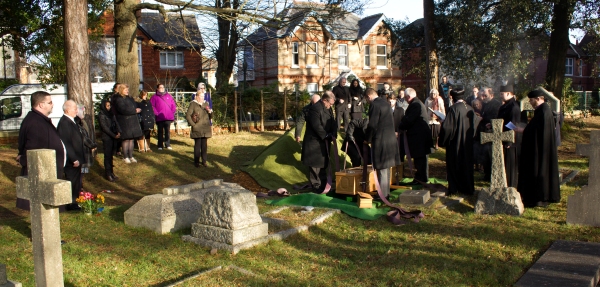Babingley’s contribution to “The Week of Prayer for Christian Unity”
For a number of years, the British Orthodox congregation at Babingley have extended a warm welcome to their neighbours to attend a special service of Evening Prayer with a guest speaker on an ecumenical theme during the Week of Prayer for Christian Unity. This year, however, it was decided to offer a day-long study session and multi-media presentation on “The Orthodox Way of Prayer”, led by Father Peter Farrington, which took place on Saturday, 24 January.
Father Peter’s two talks were well received and generated a lively discussion and fraternal exchanges, as did his illustrated presentation on “Praying with Ikons”. There were also opportunities – much valued by all present – for silent prayer, in which those present could practise the Prayer of the Heart as expounded by him. The study day opened and concluded with prayers from the Agbia. It was a great joy to have Father David Seeds and Archdeacon Alexander Astill from the Cusworth congregation supporting the day.
New Mission begins in Swindon
On Wednesday, 21st January, the first liturgy of the British Orthodox Community of St Martin in Swindon was celebrated in the Church of St Mary, Commonweal Road, Swindon. The Church had been made available thanks to the kind hospitality of the Dean of Swindon, the Revd. Simon Stevenette, who has been entirely and generously supportive of our British Orthodox missionary activity in the town.
The small, 1960s building is just the right size for our Community and has an attached hall and kitchen, providing all the necessary facilities for worship, fellowship and teaching.
On this occasion of the first liturgy there were 14 people present, both Orthodox and non-Orthodox. Some were people that have been associated with the British Orthodox Church for some time, as members or catechumens. Others were young families of Orthodox. While one couple Pentecostal couple found our liturgy entirely providentially and joined in with great enthusiasm.
An opportunity for fellowship and refreshment followed the liturgy. On the next celebration we hope that some of those known to us who were unable to attend will be present with us.
The next two liturgies are:
Wednesday, 18th February, 6:30 pm
Wednesday, 25th March, 6:30 pm
The Church of St Mary is at Commonweal Road, Swindon, Wiltshire, SN1 4LB
Father Peter attends Mission Conference
I left home on New Year’s Day and caught the 9:18 am train to London Victoria. I’d worked out that Train and Tube to Heathrow was easiest. My father might have perhaps driven me to the airport but he has been very much debilitated with the flu this year, and was still unwell. In fact the journey to the airport could not have been easier. I arrived in London on time, bought a ticket to Heathrow and headed West on the District and then Piccadilly line. I had already checked in and had only one piece of hand luggage.

Security clearance could not have been more straightforward. There were no queues. Once in the departure lounge I found a sandwich to eat, sent some emails, and waited for the gate to appear. I still had a lot of work to do in preparation for the conference. Boarding was fine and I had a seat on the aisle. No one was next to me for the flight. I spent most of it working on lecture notes and materials. The turbulence over the Adriatic was extreme. We were falling about 100 metres and rolling from side to side. There was a lot of screaming. I was concerned about transit through Cairo Airport. I have only ever done it with other people! But I disembarked, then realised I had left all my notes on board and had to go and find them. Purchasing the Visa was straightforward and then I was out of passport control and customs and into the arrival hall. My lift was outside. Someone I had met in Venice at the previous Missionary Conference. It was quite late by now. We drove into Heliopolis and I was checked in to the Hotel Beirut, just around the corner from Father Daoud’s Church of St Mark.
The next morning, early the next morning by my body clock, I was up and ready to head to the missionary conference. I was collected by a member of the missionary service and we walked the two minutes to the Church. There were already some coaches outside and I climbed into one and sat at the front. I had thought the conference was being held in a place other than that where it was. In fact St Mark’s, Heliopolis, with a congregation of 15,000 and 17 priests, has a number of retreat and conference facilities which it has built in the new developments around Cairo. I was asked to pray and gave a blessing, but then the Agpeya was placed in front of me and it seemed I was to pray all of the Third Hour, which I did.
There was some loss of the route at one point but eventually we arrived in a very large compound with several attractive buildings in the Egyptian style and lots of grounds, some of which were irrigated. I was shown to the guest room and found a cup of tea from somewhere. Father Daoud was there and we greeted each other. It became clear that there would be several talks, and that I was engaged to do two. I was prepared for these. I would also take part in a question and answer session, and I would spend much of the time recording programmes with CYC. I had been preparing the CYC material on the plane. Over the two days of the conference I was either speaking to the 200+ participants in the event, or was answering questions from the Copts who had a great interest in our experience in the UK, or was trying to grab something to eat or drink.
The CYC filming took place at a little villa also owned by St Mark’s Church, and within the grounds of the Orani Retreat and Conference Centre. I think Orani means the Mount of Olives. I had some notes on my lap, but otherwise I had to speak for 10 minutes at a time, introducing myself, on a variety of topics.
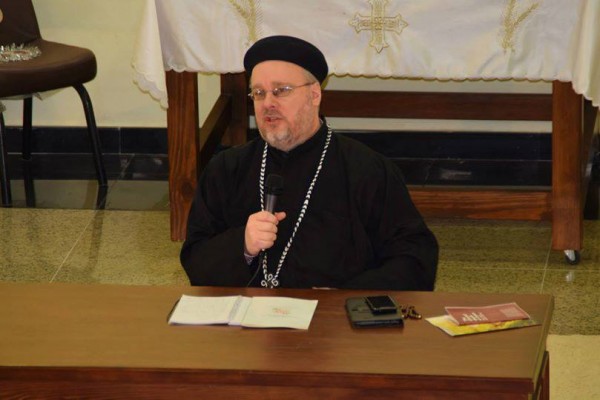
At the conference I spoke about the verse which had been selected as the theme, “Go and bear fruit”. I reflected on the character and quality of our lives as Christians which would allow us to be used of God and bear fruit. This was well received, and providentially fitted exactly into the approach that Father Daoud had adopted, which was to consider the Fruits of the Spirit and the missionary service.
My other talk was on the different methods we are using and have used in the UK to reach British people and establish small communities. This was also useful it seemed to the audience. I spoke in English and most who were there could understand. On a third occasion Father Daoud chaired a session where I was asked questions both by him and others.
The participants at the conference were of a high spiritual quality, and very committed to this ministry. Father Daoud led reflections on the various Fruits of the Spirits and invited responses which the audience seemed very ready to offer. The conference closed on the evening of the 3rd January and I returned to Cairo and the Hotel Beirut. That evening I was taken out to a restaurant by some of the people I had met in Venice.
On the 4th and 5th I was scheduled to be recording with CTV, another Coptic television channel. I didn’t see Father Daoud over these days. I was collected and taken to the professional TV studios of CTV, they provide a 24 hour output and are producing new programmes as well as news broadcasts etc. I sat in the office of the CTV Director. He spoke as much English as I did Arabic, and no one else there seemed competent in English. I was happy to sit quietly while we waited for the presenter of the programmes I would be producing to arrive. He was late. He had been up all night doing a News programme for another channel.
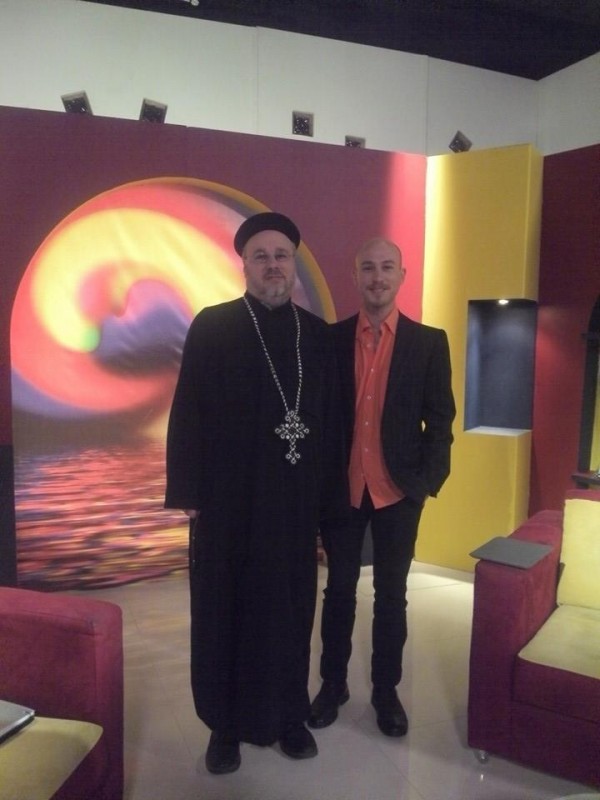
He turned out to speak fluent English. He was great company over the next two days. There was a topic for each 30 minute programme, and he opened it up with a series of leading questions and contrary criticism of what I had said. I could use no notes, so I just had to trust God and speak! It was tiring. I was more or less speaking for about 4 hours straight on one day and 3 and a half on the second.
After the recording I was taken on both days to have a little food with the Director. I had not eaten until then, although they brought tea and drinks when I asked. On the first evening of recording, the 4th January, I was collected from the hotel by a lovely young couple. They asked if I wanted to visit a church, and they took me to St Mary at Zeitoun and I prayed in the little church, as well as being invited to look around the new cathedral. I found the old Church very prayerful. It was not very busy but it had a good atmosphere.

After the second day of recording I was collected again. We drove to a large new shopping centre where I was able to purchase some small gifts for my family, then we were met by a few people I knew and some others who wanted to say hello. We had a meal together and plenty of conversation.
On my final full day I was collected by one of the older mission workers, Dr Inas. She has been working with Father Daoud as long as anyone else. We went to one of the smaller churches in the St Mark’s complex where a team from Aghapy TV were setting up cameras. Dr Inas and I discussed what we would do, arranged various topics in order and waited to be filmed. After a little while the crew were prepared. We sat facing each other before the iconostasis and essentially had a lengthy conversation about spiritual and theological topics which was recorded in 20 minute segments. This was the easiest of the recordings. The topics were ones which I could easily and fluently speak about.
When we had finished I was taken to Father Daoud’s office. I sat and talked with some of those who I had come to know quite well, about our mission in the UK. Then Father Daoud came in and we talked further. He expressed very positive views towards the British Orthodox Church. We spoke about the Medical Conference to be held in the UK at the end of February. He kindly provided me with a set of many of his English language books.
I left St Mark’s and was taken by one of the most active of the missionaries in the Asia area. He took me into Heliopolis to have a pizza and then drove me to the new monastery of St Paul in New Cairo. This is a church complex built as a modern apartment block. There were floors with rooms for congregational use, a large church built out of a couple of floors, and then monastic and guest accommodation. I was taken to a clean and well-furnished room, and rested for an hour. Then I was taken to the church, where I was to participate in the Nativity Liturgy.
I greeted Father Sawiris, one of the two monks, and a Patriarchal candidate. The service was in Coptic and Arabic. I could follow the Coptic and could see where we were in the Liturgy once it properly began. The brother of the presenter I had met at CTV introduced himself to me, he is in fact a Film Director of some note. After the Liturgy I was taken upstairs to the private quarters. Some of Father Sawiris’ family were present. We watched the continuing Liturgy at the Cathedral, then I was invited to sit at the head of the dining table and bless the food. It was more or less all meat. I had a plate filled with it and had to refuse more. Then there were chocolates and cakes before I slipped off to bed.
The next day I was collected very early, about 7 am, and driven to the airport. I said my goodbyes and headed into the terminal. Standing at the passport control a couple of American Copts introduced themselves, and one of them knew me already from the internet. I was pleased to meet them, and we went and had a coffee and talked about Orthodoxy and culture. Then I realised time was passing and headed to the Gate. There was more security there than in the terminal and I was properly scanned. I had chosen the same row of seats we had when we flew to Egypt last time, so I was able to recline my seat. And I did not have to prepare any materials so I relaxed for the first time in a week!
We were an hour delayed in leaving Cairo. Landing at Heathrow after 5 hours I took the tube back to Victoria and then the train to Maidstone, walking into my house almost exactly 12 hours after I had left the monastery. This was an extremely useful and fruitful visit to Egypt, my third. It was a blessing to be able to participate in a second Coptic Orthodox Missionary Conference and discover such a widespread interest in our British Orthodox mission in the UK.
Launch of new British Orthodox community in Bristol
The new British Orthodox community in Bristol, under the patronage of Saint Cyril the Great, was launched with a celebration of the Divine Liturgy led by Father Simon Smyth on Sunday 4 January. The Bristol Fellowship meets for worship in the Church of Saint Peter (Church of England), Church Road, Filton, Bristol, BS34 7BL. The beautiful Lady Chapel in which the Divine Liturgy was celebrated had a strong sense of prayer.

As well as being a great joy to celebrate the first liturgy for the new Bristol community, the occasion brought with it many family associations for Father Simon, as his parents had been married in Saint Peter’s Filton almost seventy years before, and he had himself attended there as a child during family visits to Bristol and had last been present for his aunt’s funeral a decade ago.
Further Liturgies are scheduled for February and March, as follows:
Sunday 1st February Incense (13.00) & Liturgy (13.30)
Sunday 15th March Incense (13.00) & Liturgy (13.30)
Joyce Edwards buried at Bournemouth
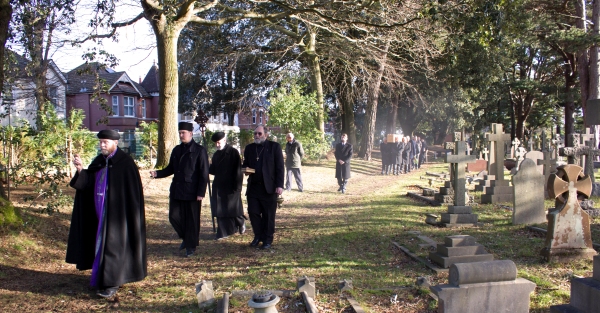
Following her death in London on 15 December, Abba Seraphim’s mother, Joyce Edwards, was transferred to Bournemouth for her burial in a church plot there. A Requiem Liturgy was held at the British Orthodox Church of Christ the Saviour in Osborne Road, Winton, celebrated by Abba Seraphim, assisted by Father Simon Smyth and Father Sergius Scott (who also personally represented His Grace Bishop Antony), Deacon Daniel Malyon and subdeacons John Morgan and Antony-Paul Holland. The Church was packed with family, friends and church members who stood around the open coffin in the centre of the church.
After the Liturgy, the burial service took place at the Wimborne Road Cemetery, conducted by Father Simon. The weather the day before had been windy with torrential showers, but the day of the funeral, through the goodness of God, was dry, sunny and mild. Tea was served afterwards at the Norfolk Royale Hotel.
Abba Seraphim said that he and other members of the family were much heartened by the many messages of condolence received, but also by the knowledge that prayers for his mother’s repose were being offered in a number of churches around the world. Among the many condolences received were those from Their Graces Bishop Serapion, of Los Angeles; H.G. Bishop Kyrillos of Milan and Papal Deputy; H.G. Bishop Youannes of BLESS; Bishop Theophilus of the Red Sea; H.G. Bishop Antony of Scotland, Ireland & N.E. England; H.G. Bishop Missael of Birmingham and Bishop Christopher Chessum of the Anglican Diocese of Southwark. H.G. Bishop Angaelos had written to Abba Seraphim: “God strengthened her through a valiant fight and blessed her with a good and full life” whilst His Eminence Metropolitan Bishoy of Damiette wrote, “Your beloved mother with a life time of one complete century is a great treasure in our time. This should be recorded in the history of the Coptic Orthodox Church especially that her son is one of the distinct metropolitans in this historical ancient church of Alexandria/Egypt where the most amazing civilization has existed in the history of humanity. May our merciful God repose her lovely soul through the intercession of our common and most high mother Saint Mary the Mother of God.” His Eminence Archbishop Gregorios of Thyateria & Great Britain (Ecumenical Patriarchate) wrote, “I understand that she was a distinguished and gracious lady who was independently-minded, being blessed with excellent health and mental agility even in her tenth decade, and who (for example) was not even then averse to setting off on holidays abroad despite being of an age when most people would have had neither the stamina nor the courage to do so. It goes without saying that she will have been a great support to you in ways that only a mother can be; and I am told that she became the ‘Mother’ to your Flock as she gathered around her the Faithful for whom you have pastoral care. You must give thanks to the Triune God for her life and for the long years that she lived, as well as for having had the privilege of her being with you for so many years, accompanying you and guiding you in your sacred ministry.” Messages and a floral tribute were also received from the priests, deacons and faithful of the UK subdiocese of the Eritrean Orthodox Tewahedo diocese of Europe as well as a number of Coptic Orthodox clergy in the UK, including Father Moussa Roshdy of Rotherham, Father Antonius Negeb of Bromley, Father Bishoy Naguib of Manchester and Father Seraphim Mina.
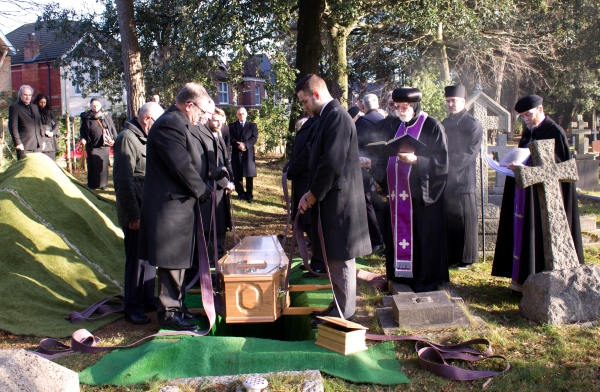
In his homily at the Requiem Liturgy, Abba Seraphim said,
“The Sacred Scriptures open with a magnificent and poetic description of the Creation of the Cosmos, of which the highlight is the creation of man, whom God formed from the dust of the ground, breathing into his nostrils the breath of life, so that he became a living soul.
Yet God, Who alone is immortal, as the creator and maker of man, decreed as the punishment for man’s disobedience, that it would be his lot to return to the ground from which he came, and from which he had been sustained during his life on earth, “For out of it wast thou taken, for dust thou art and unto dust shalt thou return.”
The Russian Contakion of the Departed – one of the hymns of the Orthodox Church – witnesses to this as our common end, saying “All we go down to the dust, and weeping oe’r the grave, we make our song: Alleluia, Alleluia, Alleluia !” It is a solemn and sobering thought when we come to part with those we have loved and cherished in life and the weeping reflects our sense of loss and grief.
Yet notice what is the song given to us to sing: “Alleluia, Alleluia, Alleluia !” These words, taken directly from the Hebrew by the earliest Christians, mean “Praise God” – indeed it is a superlative expression of thanksgiving, joy and triumph. In the Roman Rite it is linked particularly to Easter or Holy Pascha but not sung during Lent, as opposed to the Orthodox liturgical tradition where it is sung throughout the entire year.
To the world, – a term the Bible often uses to describe those who do not share the Christian faith – this thankfulness seems at best misplaced, or more generally altogether appears foolishness. But, who is the fool ? The Psalmist tells us, “The fool has said in his heart, ‘There is no God.’ (Psalm LIII: 1) whilst the Apostle Paul tells us that “The wisdom of this world is foolishness with God” (1 Corinthians III: 19-20) and warns us that “The natural man does not receive the things of the Spirit of God, for they are foolishness to him; nor can he know them, because they are spiritually discerned” (1 Corinthians II: 14-15).
As Christians we do not worship a God whom we cannot know or who cares little for us, but rather we worship Him from whom “every good gift and every perfect gift” (James I: 17) is bestowed on us and “Who so loved the world (this time used to encompass all of God’s creation) that He gave His only-begotten Son, that whosever believeth in Him should not perish, but have everlasting life.” (John III: 16)
Through the Resurrection of our Lord Jesus Christ we see that death has been vanquished and that life and immortality are the promise that awaits us. That breath of life, which makes us living souls has not been quenched by death. St. Paul reveals the thread which links us with the creation of man, the resurrection of Christ and our own future condition, “For since by man came death, by man came also the resurrection of the dead. For as in Adam all die, even so in Christ shall all be made alive.” (1 Corinthians XV: 21-22).
Our father among the saints, St. John Chrysostom has left us a sermon on the Resurrection, which in the Byzantine tradition is read at the Paschal Vigil service. It eloquently expresses the Christian belief in resurrection:
“Let none fear death; for death of the Saviour has set us free.
He has destroyed death by undergoing death.
He has despoiled hell by descending into hell.
He vexed it even as it tasted of His flesh.
Isaiah foretold this when he cried:
Hell was filled with bitterness when it met Thee face to face below;
filled with bitterness, for it was brought to nothing;
filled with bitterness, for it was mocked;
filled with bitterness, for it was overthrown;
filled with bitterness, for it was put in chains.
Hell received a body, and encountered God. It received earth, and confronted heaven.
O death, where is your sting?
O hell, where is your victory?
Christ is risen! And you, o death, are annihilated!
Christ is risen! And the evil ones are cast down!
Christ is risen! And the angels rejoice!
Christ is risen! And life is liberated!
Christ is risen! And the tomb is emptied of its dead;
for Christ having risen from the dead,
is become the first-fruits of those who have fallen asleep.”
When the very first corn and other crops begin to shoot they are the promise that more is to follow. These are the biblical first-fruits, which were offered by the priest in thankfulness and faith in the rich harvest which would soon follow. St. Paul tells us that “Now is Christ risen from the dead, and become the firstfruits of them that slept.” (1 Corinthians XV: 20). If Christ is the firstfruits then the righteous, those who have fallen asleep as well as those who remain at the coming of the Lord, are the promised harvest.
Alleluia: Thanksgiving, Joy and Triumph. Thanksgiving, for the assurance that Joyce has passed from death to life eternal; that she has a merciful and loving Saviour Who will grant her forgiveness of her sins; Joy, because she has set her hope in God, the author and maker of her being, so that she now rests in Paradise, where the Choirs of the Saints and the Glorious Assembly of the Just shine like the stars of heaven; and where sorrow and pain are no more, neither sighing, but life everlasting; and Triumph, that she will be numbered with those who rest in the paradise of joy awaiting that great Day of Resurrection when they will dwell in newness of life.
So indeed, let us we make our song, Alleluia, Alleluia, Alleluia !”
